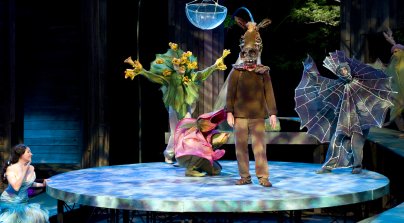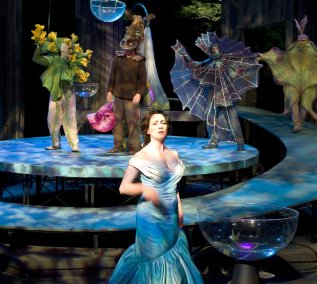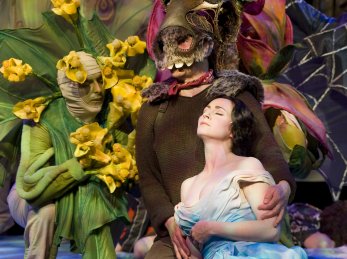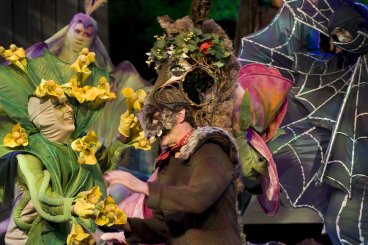Summary 
Produced outdoors on a hilltop in the Wisconsin woods: excellent costumes, ethereal lighting. Modernized to late-20th century Athens: a construction site with the Mechanicals as workers preparing for the wedding ceremony. A husband-and-wife team portrays both fairy royalty (he muscle-bound, she raven-haired) and human royal couple (wigged like Bill and Hillary Clinton). The four lovers are a spoiled rich girl, her surfer-dude boyfriend, an inhaler-toting nerd, and a long-haired groupie.
Design
Directed by William Brown. Costumes by Rachel Healy. Set by Todd Rosenthal. Lights by Michael Peterson. Sound by Andrew Hansen.
Cast
Michael Huftile (Theseus/Oberon), Corey Cannon (Hippolyta/Titania), James Ridge (Egeus), Tiffany Scott (Hermia), Matt Schwader (Lysander), Steve Haggard (Demetrius), Carrie Coon (Helena), Jonathan Smoots (Bottom), Marcus Truschinski (Puck).
Analysis

American Players Theatre (APT) modernizes A Midsummer Night's Dream to late-20th-century Athens. Bottom and the hempen homespuns - a construction crew clad in tool-belts, shorts, T-shirts and bandanas - work amid drop cloths, paint buckets, tool chests, and even a blaring boom-box and blue port-a-potty upstage center, preparing for the royal wedding ceremony. Bottom's crew, with the Philostrate their foreman, create such a din with hammers and saws that the APT public address announcer abbreviates his pre-show prohibitions against cell phones and cellophane-wrapped candy with a droll, "Oh, forget it." These opening moments establish a playful tone for the entire performance.
The typically doubled roles of Theseus and Hippolyta with Oberon and Titania are at APT performed by an actual husband-and-wife team, spicing the inherent battle-of-the-sexes chemistry. The fairy king, muscle-bound and bare-chested, roars at his defiant wife, she slinky and sexy with raven-black hair. In the bookending human scenes, the couple is played as well-seasoned politicians, Theseus a heavily-padded, gray-wigged and bespectacled autocrat with an amiable drawl and more than a passing resemblance to Bill Clinton, and Hippolyta is his sharp-tongued, pants-suited, short-blonde-haired Hillary-like fiancé. They amiably disagree during the opening sequence as Theseus is comically fitted by a dexterous tailor with a measuring tape.

William Brown directs A Midsummer Night's Dream atop a hill reached by a winding trail deep in the southern Wisconsin woods. On this particular late summer night, the company performs bravely in a persistent drizzle, the stage slick and slippery, their costumes appearing to soak through. The experience delights, a warm but not unpleasant evening in the woods, constant but never heavy rain, a colorful and warm-hearted play presented before a looming natural backdrop of swaying and eerily lit trees. The drenched crowd enthusiastically supports the show, though at intermission they queue in long lines at APT's concession stands for hot coffee and warm cocoa, as well as at the gift shops for $5 hooded plastic ponchos.
The four lovers begin the production by creating a commotion like an episode from the Jerry Springer show that drives Bottom to comically seek shelter within the upstage port-a-potty. The characters are colorfully drawn, with Hermia a voluptuous and spoiled debutante, Lysander her permed and swaggering surfer-dude boyfriend, Demetrius a sweater-vested nerd with inhaler and bug spray, and Helena toting a guitar case like a hippie from the 1960s. Brown infuses the show with lively flourishes, such as the paternally stern Egeus shouting "yes!" at Theseus' 1.1 remark that "your father should be as a god," later yanking the too-cool sunglasses from Lysander's face, or calling the young man to him but then just using his shoulder as support to descend from the stage. The Mechanicals, like the audience, root for youthful romance, and they conclude their construction-work break time with unprompted applause. The quartet indeed endears: the spoiled princess Hermia fans herself with her own hands in her pubescent turmoil; the leisure-suited Lysander growls carnally and later wipes a bug from the bottom of his shoe in the forest; Demetrius, in shorts, backpack and spectacles, lays out a blanket with a wicker food basket and a bottle of wine for a seductive picnic; and Helena scurries hard upon Demetrius' heels like a star-struck rock-and-roll groupie.

The attractive young players amuse, but Puck - tall, athletic and clad in black-leather like a rock star - establishes himself as the crowd favorite (especially as a heart-throb with the teen-aged school-children bused in for the performance) through an impressive array of twirling dance-moves, leaping splits, and sprinting slides across the rain-slickened stage. The forest scenes begin with thumping tribal drumbeats and are played within eerie neon shades of light. Large bowls of water reflect the lighting, and Puck suspends a bowl at center stage from an overhanging arm, then howls at the moon as violet light plays off the shimmering water. Brown depicts both Puck and Oberon as playfully mischievous - Oberon dispels a gaggle of young girls by hurling an invisible ball of buzzing bees, then Puck ties together the hair-ribbons of two fleeing girls - and as gently affectionate and almost nurturing of the lovelorn humans in their forest: "O, what fools these mortals be."
APT, a classical company that mounted its first production in 1980, typically produces five plays in repertory, all staged outdoors in a large thousand-seat ampitheater. APT resides in the tiny town of Spring Green with its sparse population of 1,444, but the company enjoys large crowds - generally exceeding 100,000 ticket sales in a season - and the spirit of each evening's performance is a communal affair, with picnic tables packed with families and friends like tailgaters at a sporting event. The design team's creativity belies the rustic setting, and the consummate attention to detail is evidenced by the fanciful costuming of Titania's servant fairies in 3.1 that nearly upstage the ass-headed Bottom: the actor portraying Cobweb, clad head to toe in black, has silvery webs across him and feathered between his arms like wings, so when he stops and poses he actually resembles a shimmering spider's web; Mustardseed stands vibrant in shades of green and yellow like a six-foot stalk with a dozen protruding yellow flowers; Moth is a fluttering near-butterfly in a gray costume and twin-feathered cap that would be a Halloween night delight; and the filmy pink-winged Peaseblossom in her bulbous head dress is quick to comply with Bottom's urgent request for head-scratching.

Brown succeeds in his endeavor to craft a gentle entertainment during an election-year summer beset by on-going war and financial crises. He concludes the show with a formal wedding and memorably dazzling dance sequence. The couples return to the stage for their marriages and are tended to by waiters and waitresses in tuxedoes. The awful entertainment from Bottom and company is gently chided, and with the backdrop of forest under lit in lavender and turquoise, the characters join a Greek line-dance ("Opa!") that starts at medium tempo, slows to a near-stop, then increases in speed to a rousing high-kicking finish that has the crowd standing to not just applaud but cheer the finale of this charming production.